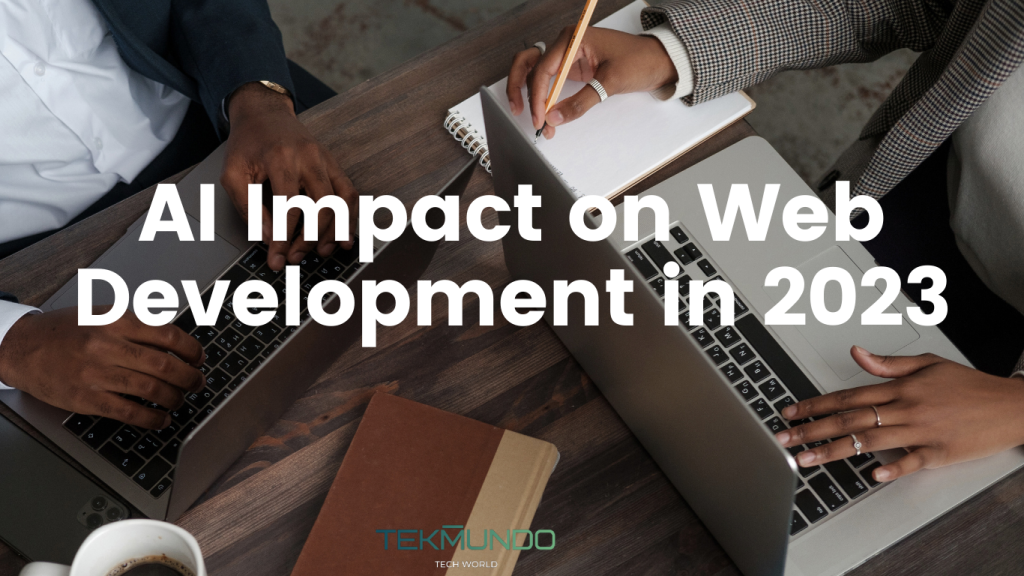Over the past few years, the marriage between Artificial Intelligence (AI) and web development has become increasingly inseparable. The recent strides in AI technologies are having profound effects on the way web developers design, implement, and maintain websites.
In this article, we’ll delve into the specifics of how AI is reshaping the landscape of web development as we know it in 2023.
The Advent of AI in Web Development
Before we jump into the nuances of AI’s impact, it’s crucial to understand the context. Web development has always been about enhancing user experience, streamlining design processes, and improving website functionalities. AI, with its ability to analyze, learn, and predict, has simply amplified these objectives.
Is AI Set to Eclipse Web Development?
While the numbers hint at AI’s growing dominance in the web development sector, it’s essential to note that AI can streamline numerous design and development tasks. Its burgeoning role suggests an expansive utilization in the near future.
However, AI isn’t poised to overshadow the intrinsic human capabilities—such as unique problem-solving methods and unparalleled creativity—crucial for crafting intricate web applications.
As such, developers are encouraged to harness AI’s capabilities to amplify their productivity without fearing its complete takeover.
Key Areas of AI Impact on Web Development in 2023
1. Automated Web Design & Content Creation
Gone are the days when creating a website required exhaustive coding and design expertise. In 2023, AI-driven tools like Wix‘s ADI (Artificial Design Intelligence) or Adobe’s Sensei have made it possible for even novices to produce websites that are not only functional but also aesthetically appealing.
According to a 2022 survey by Web Designer Depot, 38% of small businesses utilized AI-driven design platforms to establish their initial online presence.
2. Improved User Experience through Predictive Analysis
AI’s predictive capabilities have revolutionized user experience. Websites now use AI to analyze user behavior, understanding their preferences, and predicting what they might search for next.
This personalized experience ensures users find what they’re looking for quickly and efficiently.
Websites utilizing AI for predictive analysis have seen a 23% increase in user retention rates, as reported by Digital Marketing Institute in 2023.
3. Chatbots & Customer Support
The rise of chatbots in the past few years is hard to ignore. They’ve become an integral part of websites, offering 24/7 support, answering queries, and assisting in sales.
The advancement in Natural Language Processing (NLP) ensures that these chatbots understand and respond to user queries more effectively than ever.
Gartner predicted that by 2023, chatbots would power 85% of customer service interactions. The reality isn’t far off, with over 80% of businesses now integrating chatbots on their websites.
4. Advanced Data Analysis & Reporting
Websites today are no longer just about displaying content; they’re about understanding users. AI-driven analytics tools can sift through vast amounts of data, drawing actionable insights for businesses. These insights help in refining marketing strategies, optimizing content, and enhancing overall user engagement.
5. Improved Accessibility
With AI, websites can now be more inclusive. Features like automatic image descriptions, voice navigation, and predictive text-to-speech functionalities have made the web more accessible to people with disabilities.
The Challenges and The Future
While the AI impact on web development in 2023 has been largely positive, it’s essential to consider the challenges. There are concerns about data privacy, the possibility of over-dependence on AI, and the need for proper regulations.
However, the future looks promising. As AI technologies become more refined, we can expect even more personalized user experiences, more efficient web development processes, and a web landscape that’s dynamic, responsive, and inclusive.
AI’s in Web Development’s Market Landscape
Based on recent data from Grand View Research, the AI industry is set for an impressive 37.3% annual growth between 2023 and 2030.
By 2025, the industry’s revenue is projected to reach a staggering $126 billion. Diving into AI’s influence on web design and development, HubSpot’s data reveals:
- 58% of designers employ AI tools for imagery.
- 50% utilize AI for web page layouts.
- 49% validate their design strategies using AI tools.
- 43% tap into AI for design fine-tuning.
- 40% assess design excellence through AI mechanisms, and
- 20% harness AI to gauge user experience.
These numbers underscore the prominent role AI tools play in modern web design and development.
The Verdict: Should Web Developers Embrace AI?
AI stands at the forefront of technological advancement, offering myriad solutions to complex challenges. It’s highly advantageous for web designers and developers to familiarize themselves with AI to enhance their website and app-building prowess.
AI plays a pivotal role in boosting customer engagement—a paramount concern in today’s digital age. By blending AI with traditional web development techniques, developers can engineer state-of-the-art applications in record time.
In the business world, there’s a growing demand for developers skilled in merging AI with web development practices to produce user-focused platforms. So, it’s imperative for web developers to integrate AI into their repertoire.






